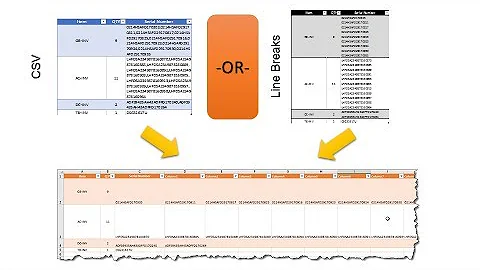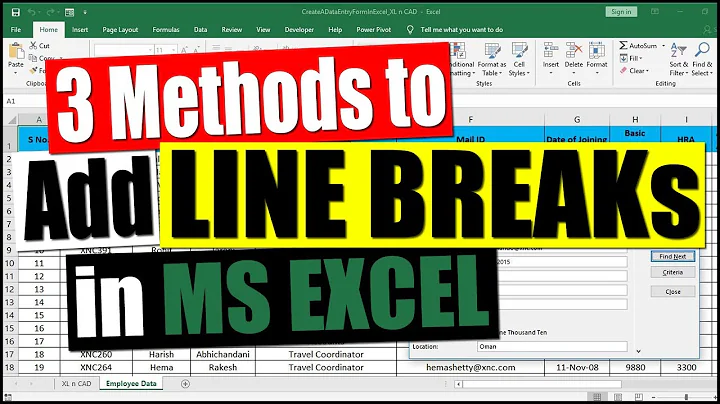Split command output by linebreak?
Solution 1
What about read in a while loop?
some command returning multiple lines | while IFS= read -r line ; do
echo "$line"
done
Be careful, though, the pipe is run in a subshell, which means you cannot change variable values for the rest of the script. If you need something to survive from your while loop, you can use bash's process substitution:
while IFS= read -r line ; do
let var+=line
done < <(some command returning multiple lines)
echo "$var"
Solution 2
Setting IFS to only a newline is not enough. (Why are you also splitting at backspace characters, by the way?)
In your code, ${ROWS[@]} (which is a strange way to write $ROWS — ROWS is not an array) is not double-quoted. (If it was inside double quotes, you'd get a single string, since ROWS is not an array.) So the shell splits the value of the variable into fields at each IFS character, then treats each field as a glob pattern. For example, if one of the lines printed by the command contains the single character *, this will be replaced by the file names in the current directory.
You can turn off globbing with set -f. In most cases where you set IFS to use the shell's field splitting feature, you also need to turn off globbing. Set it back on with set +f.
The reliable idiom for reading a command's output line by line is while IFS= read -r.
some command returning multiple lines |
while IFS= read -r ROW; do
…
done
Note that most shells run each command of a pipeline in a separate subshell. So if you need to set variables and use them after the loop, wrap these commands in a group together with the loop. (Ksh and zsh are the exceptions, they run the last command of a pipeline in the parent shell.)
some command returning multiple lines | {
while IFS= read -r ROW; do
…
row_count=$((row_count+1))
done
echo "There were $row_count rows."
}
Solution 3
You are mixing the here-document and here-string syntax in your update question.
Either use here-document:
while IFS= read -r line ; do
let var+=line #line 42
done <<ENDMARK
$(sqlite3 -list -nullvalue NULL -separator ',' /var/log/asterisk/master.db "${QUERY}")
ENDMARK
Or here-string:
while IFS= read -r line ; do
let var+=line #line 42
done <<< $(sqlite3 -list -nullvalue NULL -separator ',' /var/log/asterisk/master.db "${QUERY}")
Related videos on Youtube
Nik
Updated on September 18, 2022Comments
-
Nik almost 2 years
I have a command returning multiple lines. For further processing I need to process each single line of those lines.
My current code works by modifying the IFS (Internal Field Separator):
ROWS=$(some command returning multiple lines) O=$IFS #save original IFS IFS=$(echo -en "\n\b") # set IFS to linebreak for ROW in ${ROWS[@]} do echo "$ROW" done IFS=$O #restore old IFSI am wondering, is there a better way to access the single lines of the multiple lines output, one without modifying the IFS? Especially the readability of my script gets bad by modifying the IFS.
Update: I have troubles to get the answers working, e.g the one from choroba:
while IFS= read -r line ; do let var+=line #line 42 done << $(sqlite3 -list -nullvalue NULL -separator ',' /var/log/asterisk/master.db "${QUERY}") echo "$var" # line 44gives me
./bla.sh: row 44: Warning: here-document at line 43 delimited by end-of-file (wanted `$(sqlite3 -list -nullvalue NULL -separator , /var/log/asterisk/master.db ${QUERY})') ./bla.sh: row 42: let: echo "": syntax error: invalid arithmetic operator. (error causing character is \"""\").Anyone can help me with this? Thanks!
-
 Admin almost 12 yearschoroba's answer says to do
Admin almost 12 yearschoroba's answer says to do< <(some command returning multiple lines), but that's not what you are doing. -
 Admin about 8 years
Admin about 8 years
-
-
tcoolspy almost 12 yearsUsing process substitution is a smart solution for this in
bash, but it's worth noting that the subshell scoping of variables is only a problem inbash, doing the same thing inzshwould not have this issue at all. -
 Razzlero almost 12 yearsksh doesn't have this issue either.
Razzlero almost 12 yearsksh doesn't have this issue either. -
Nik almost 12 yearsthank you guys, I tried this solution, but I can't get it working, please see my updated original post, thanks!
-
choroba almost 12 years@stefan.at.wpf: You cannot place spaces and dollar signs around at will. They have meaning.




